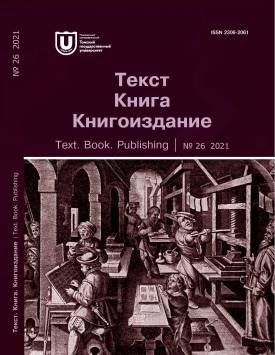Expressive Features of Author Subjectivity in the Literary Ego-Text (Roman Senchin’s What Do You Want?)
The modern literary process indicates the presence of a large number of fiction with documentary subcurrent: facts from the author’s biography are a very slight hyperbolization. An example of such work would be the novel What Do You Want? (2013) by a contemporary Russian writer Roman Senchin, which became the subject of consideration in this article. The synthesis of auto-documentary and literary principles in the story organizes self-narration with unsteady boundaries between the real (“factual”) and the fictional (“fictitious”). The specificity of the correlation of the factual and the fictitious is examined in this work using the method of literary criticism and contextual analysis. The immediate aim of the article is to identify the specificity of expressing the implicit method of author subjectivity in non-fiction. In the author’s opinion, the implicit way of expressing the reflective type of author subjectivity fits more harmoniously into the literary fabric of the work, enriching it with subtexts and hidden meanings. In the course of the study it has been determined that although the center of the story revolves around the everyday life of an ordinary Moscow family, Senchin’s work is not a slice-of-life novel, but a political commentary. The theme of What Do You Want?” is sociopolitical, the problematics are sociocultural. The narration of the novel undergoes an intense analyzing and coming to terms with the sociopolitical events that are highlighted in almost all of the scenes. The text implies that the writer comprehends his own political position and interprets its cause-effect relationships. In order to distance himself as much as possible from his own identity, Senchin uses the technique of “externalizing” and “assigns” the role of the narrator to a teenage girl Dasha, the prototype of which he himself cannot be. Dasha, being a narrator-observer, asks questions, including the one from the title, to herself and other characters, including the father “Roman Senchin”. The time frame for the narration is precisely established: 18 December 2011 -26 February 2012; each part of the text is a certain day, there are six in total. However, it is not clear who marked the specific days - the real author of the story or, as he conceived, the narrator Dasha. The autofiction method of “externalizing” in combination with the factual plot allows considering What Do You Want? as an ego-text, which in its genre form is something between an excerpt from a family chronicle and a diary. Autofiction in the form of an ego-text allows the writer to implicate his reflection, organizing a space for discussion of the unquestioning “Roman Senchin” (his alter ego) and the doubting Dasha within a kind of a “mental diary” - a space of consciousness in which the author-subject and the narrator are united. “Bringing to light” this “mental” diary, the writer redirects it to a wide range of readers and thus shifts the story from the field of “literature without fiction” to the sphere of art.
Keywords
Roman Senchin, What Do You Want?, non-fiction, autofiction, author subjectivity, implicitness, ego-text, self-interpretationAuthors
| Name | Organization | |
| Shum Olga Yu. | V.I. Vernadsky Crimean Federal University | shum_olga@list.ru |
References

Expressive Features of Author Subjectivity in the Literary Ego-Text (Roman Senchin’s What Do You Want?) | Tekst. Kniga. Knigoizdanie - Text. Book. Publishing. 2021. № 26. DOI: 10.17223/23062061/26/2
